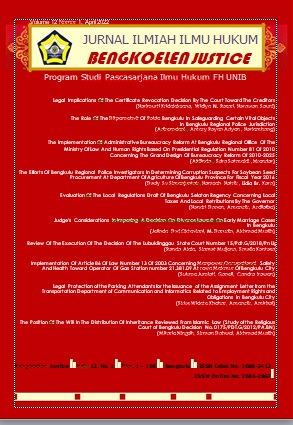Main Article Content
Abstract
This study aimed to analyze and to explain the legal implications of the court decision which stated that the certificate of ownership was revoked, furthermore it became the mortage right toward the bank as the holder of the mortgage right in the Home Ownership Credit Agreement. The research method used was normative legal research with a statute approach and a case approach. The results of the research showed that with the court's decision, the certificate of ownership rights which became the mortgage rights was no longer legally enforceable, namely 60 (sixty) working days after the court decision has obtained permanent legal force as referred to in Article 116 paragraph (1) of The Administrative Court Law. The decision was accepted if the Defendant did not fulfill his obligations. This also applied regardless of whether or not a revocation request was made to the Head of the local Land Office. Then automatically the mortgage rights also did not have legal force anymore, although this was not regulated in the provisions of the UUHT. However, the credit agreement did not become nullified or canceled, then there was a shift in the position of the bank from the original creditor which was prioritized to be a concurrent creditor.
Keywords
Article Details
References
- Book
- Dani Elpah, Titik Singgung Kewenangan Antara Peradilan Tata Usaha Negara dengan Peradilan Umum Dalam Sengketa Pertanahan, Laporan Penelitian Puslitbang Hukum dan Peradilan Badan Litbang Diklat Kumdil Mahkamah Agung, Jakarta, 2014.
- Habib Adjie, Hak Tanggungan sebagai Lembaga Jaminan atas Tanah, Mandar Maju ,Bandung, 2000.
- H. Supandi, Hukum Peradilan Tata Usaha Negara, Edisi Kedua, Cetakan ke-1, PT. Alumni, Bandung, 2016.
- Munir Fuady, Hukum Perkreditan Kontemporer, PT. Citra Aditya Bakti, Bandung, 1996.
- M. Bahsan, Penilaian Jaminan Kredit Perbankan Indonesia, Rejeki Agung, Jakarta, 2002.
- Regulation
- Kitab Undang-Undang Hukum Perdata.
- Undang-Undang Republik Indonesia Nomor 5 Tahun 1960 Tentang Peraturan Dasar-Dasar Pokok Agraria (Lembaran Negara Tahun 1960 Nomor 104, Tambahan Lembaran Negara Nomor 2043).
- Undang-Undang Republik Indonesia Nomor 5 Tahun 1986 Tentang Peradilan Tata Usaha Negara (Tambahan Lembaran Negara Republik Indonesia Nomor 3344).
- Undang-Undang Republik Indonesia Nomor 9 Tahun 2004 Tentang Perubahan Atas Undang- Undang Republik Indonesia Nomor 5 Tahun 1986 Tentang Peradilan Tata Usaha Negara (Tambahan Lembaran Negara Republik Indonesia Nomor 4380).
- Undang-Undang Republik Indonesia Nomor 51 Tahun 2009 Tentang Perubahan Kedua Atas Undang-Undang Republik Indonesia Nomor 5 Tahun 1986 Tentang Peradilan Tata Usaha Negara (Tambahan Lembaran Negara Republik Indonesia Nomor 5079).
- Undang-Undang Republik Indonesia Nomor 4 Tahun 1996 Tentang Hak Tanggungan Atas Tanah Beserta Benda-Benda Yang Berkaitan Dengan Tanah, (Lembaran Negara Tahun 2014 Nomor 292, Tambahan Lembaran Negara nomor 5601).
- Peraturan Menteri Agraria dan Tata Ruang/Kepala Badan Pertanahan Nasional Republik Indonesia Nomor 11 Tahun 2016 tentang Penyelesaian Kasus Pertanahan.
- Peraturan Menteri Agraria dan Tata Ruang/Kepala Badan Pertanahan Nasional Republik Indonesia Nomor 21 Tahun 2020 Tentang Penanganan dan Penyelesaian Kasus Pertanahan.
References
Book
Dani Elpah, Titik Singgung Kewenangan Antara Peradilan Tata Usaha Negara dengan Peradilan Umum Dalam Sengketa Pertanahan, Laporan Penelitian Puslitbang Hukum dan Peradilan Badan Litbang Diklat Kumdil Mahkamah Agung, Jakarta, 2014.
Habib Adjie, Hak Tanggungan sebagai Lembaga Jaminan atas Tanah, Mandar Maju ,Bandung, 2000.
H. Supandi, Hukum Peradilan Tata Usaha Negara, Edisi Kedua, Cetakan ke-1, PT. Alumni, Bandung, 2016.
Munir Fuady, Hukum Perkreditan Kontemporer, PT. Citra Aditya Bakti, Bandung, 1996.
M. Bahsan, Penilaian Jaminan Kredit Perbankan Indonesia, Rejeki Agung, Jakarta, 2002.
Regulation
Kitab Undang-Undang Hukum Perdata.
Undang-Undang Republik Indonesia Nomor 5 Tahun 1960 Tentang Peraturan Dasar-Dasar Pokok Agraria (Lembaran Negara Tahun 1960 Nomor 104, Tambahan Lembaran Negara Nomor 2043).
Undang-Undang Republik Indonesia Nomor 5 Tahun 1986 Tentang Peradilan Tata Usaha Negara (Tambahan Lembaran Negara Republik Indonesia Nomor 3344).
Undang-Undang Republik Indonesia Nomor 9 Tahun 2004 Tentang Perubahan Atas Undang- Undang Republik Indonesia Nomor 5 Tahun 1986 Tentang Peradilan Tata Usaha Negara (Tambahan Lembaran Negara Republik Indonesia Nomor 4380).
Undang-Undang Republik Indonesia Nomor 51 Tahun 2009 Tentang Perubahan Kedua Atas Undang-Undang Republik Indonesia Nomor 5 Tahun 1986 Tentang Peradilan Tata Usaha Negara (Tambahan Lembaran Negara Republik Indonesia Nomor 5079).
Undang-Undang Republik Indonesia Nomor 4 Tahun 1996 Tentang Hak Tanggungan Atas Tanah Beserta Benda-Benda Yang Berkaitan Dengan Tanah, (Lembaran Negara Tahun 2014 Nomor 292, Tambahan Lembaran Negara nomor 5601).
Peraturan Menteri Agraria dan Tata Ruang/Kepala Badan Pertanahan Nasional Republik Indonesia Nomor 11 Tahun 2016 tentang Penyelesaian Kasus Pertanahan.
Peraturan Menteri Agraria dan Tata Ruang/Kepala Badan Pertanahan Nasional Republik Indonesia Nomor 21 Tahun 2020 Tentang Penanganan dan Penyelesaian Kasus Pertanahan.

